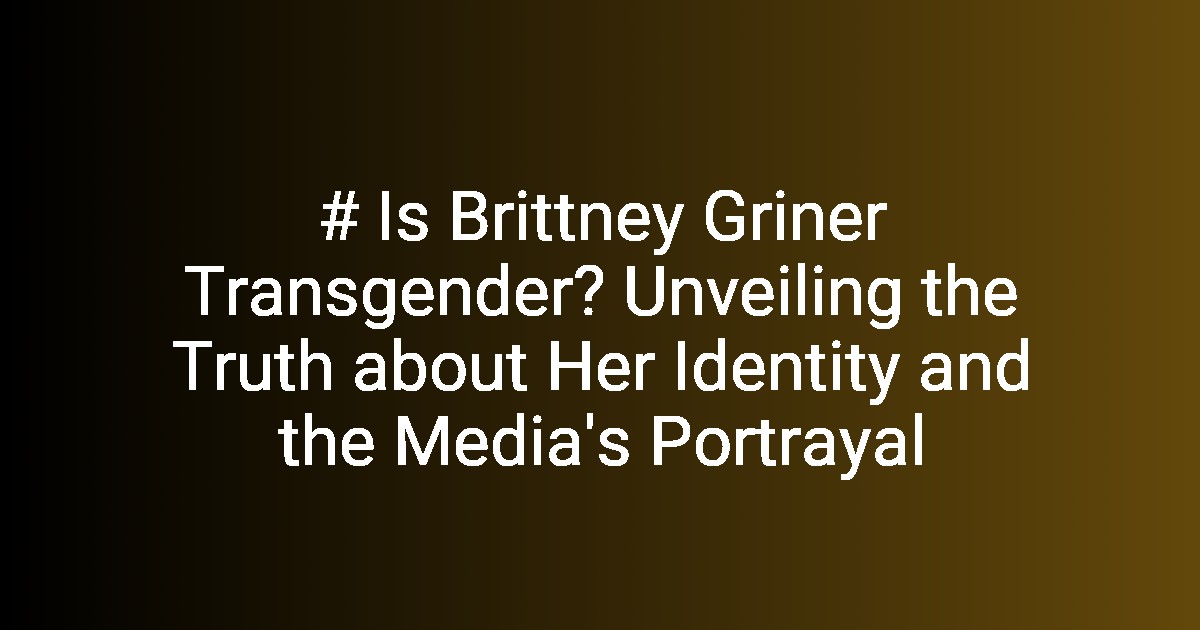The world of sports has long been a hotbed for discussions surrounding identity, with athletes’ personal lives often becoming fodder for media speculation. This article aims to shed light on the misconceptions and truths surrounding Brittney Griner’s gender identity, dissecting how the media has portrayed her and analyzing the impact of such representations. Join us as we explore the complexities of identity in the public eye and the importance of accurate and sensitive representation.
Making Sense of Brittney Griner’s Sexuality
Clarifying Terms: Understanding Sexual Orientation and Gender Identity
In the context of Brittney Griner’s identity, it’s essential to differentiate between sexual orientation and gender identity. Sexual orientation refers to an individual’s physical, romantic, and/or emotional attraction to others, whereas gender identity relates to an individual’s innermost concept of self regarding being a man, woman, both, or neither.
The media, at times, incorrectly conflates these two aspects, leading to misinformation and false assumptions about an individual’s identity. This is particularly evident when discussing Griner’s sexuality, as she has explicitly identified as a lesbian or gay woman, a distinction that many media outlets and individuals have failed to recognize or respect.
Brittney Griner’s Own Words: Expressing Her Identity
Griner has been open about her identity in various interviews and public statements. In her own words:
> “I am a strong, Black, proud, lesbian woman. I am an athlete, an activist, and the person I love is also a woman.” — Brittney Griner
These statements reinforce her identity as a gay or lesbian woman, emphasizing the importance of self-expression and visibility in the LGBTQ+ community.
Analyzing the Media Portrayal
The History of Media Coverage: Origins of Speculation
The media’s speculation about Griner’s gender identity can be traced back to her early career, where her masculine presentation and athletic prowess in women’s basketball fuelled conversations about her gender. However, such discussions often overlook the complexities of identity and reduce Griner’s identity to a simplistic narrative.
Impact of False Narratives: Misgendering and Misinformation
The consequences of misgendering and spreading misinformation about an individual’s identity can be significant. For athletes like Griner, the constant scrutiny and speculation can take a toll on their well-being and mental health.
Case Study:
Other athletes, such as Olympic gold medalist Caster Semenya, have faced similar scrutiny over their gender identity. Semenya, a South African middle-distance runner, was subjected to invasive gender verification tests and public scrutiny, which impacted her performance and well-being.
This constant scrutiny perpetuates stereotype and can undermine the hard-earned accomplishments of athletes, distracting from their sporting excellence and contributions to their respective fields.
Understanding the Legal and Social Context
Legal Perspective: Rights and Protections for Transgender Individuals
From a legal standpoint, it’s crucial to understand the rights and protections afforded to transgender and gender non-conforming individuals. In many countries, including the United States, transgender individuals are protected by anti-discrimination laws, which prohibit discrimination based on gender identity or expression in various aspects of life, including employment, housing, and public accommodations.
Sports leagues and governments have also taken steps to promote inclusion and equality for transgender athletes. For instance, the International Olympic Committee has established guidelines for transgender participation in sports, allowing athletes to compete under their identified gender if they meet certain requirements.
Social Acceptance: Attitudes Towards LGBTQ+ Individuals
While legal protections are crucial, social acceptance and understanding are equally important. Society’s attitudes towards transgender and LGBTQ+ individuals have evolved over time, with increasing visibility and acceptance of diverse gender identities and sexual orientations.
However, progress is not uniform, and challenges remain, with ongoing discrimination, harassment, and even violence directed at transgender individuals and other members of the LGBTQ+ community. It’s imperative to continue promoting dialogue, education, and acceptance to foster an inclusive society that values diversity.
Brittney Griner’s Impact and Legacy
Championing LGBTQ+ Rights: Her Influence
Brittney Griner’s influence as an openly gay woman in a professional sports league is significant. She has become an icon and an inspiration for many in the LGBTQ+ community, especially within the sports world. Her visibility and success send a powerful message that talented, ambitious individuals can thrive regardless of their sexual orientation or gender identity.
Moving Forward: Preventing Misrepresentation
To prevent similar misrepresentations of identity in the future, it’s crucial for the media and society as a whole to promote accurate reporting and respectful dialogue about identity. This includes using the correct terminology, respecting individuals’ self-identified gender and sexual orientations, and avoiding stereotypes or sensationalism when discussing sensitive topics.
Conclusion: Embracing Diversity and Inclusion
Summarizing Key Points
Brittney Griner, a talented basketball player, has navigated a complex journey in the public eye. While there has been widespread speculation about her gender identity, it’s vital to understand that Griner has consistently identified as a lesbian or gay woman, and not as transgender. Her story underscores the importance of accurate and sensitive representation of identity in the media and in society at large.
A Call to Action: Supporting Diverse Voices
As we conclude this exploration of Griner’s identity, it’s clear that progress towards acceptance and inclusion of LGBTQ+ individuals is vital. We encourage readers to educate themselves on LGBTQ+ issues, support diverse voices, and engage in respectful conversations that promote unity and understanding. Together, we can create a more inclusive world that celebrates the diversity of its members.
Table: Summarizing Key Points
Columns:
– Misconceptions
– Truths
– Impact
Rows:
– The media suggests Griner is transgender.
– Griner has identified as a lesbian or gay woman.
– Speculation impacts her well-being and public perception.
– Griner is an icon for LGBTQ+ rights.
– Accuracy in representation is crucial.

